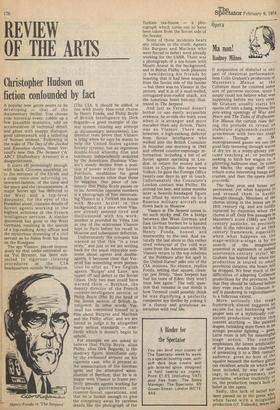Christopher Hudson on fiction confounded by fact
A popular new genre seems to be developing — that of the documentary thriller. You choose your historical event, cobble up a few plausible statistics, add an accumulation of technical detail, and gloze with snappy dialogue, good camerawork and a lathering of 'human interest.' Following in the wake of The Day of the Jackal and Executive Action, Henri Verneuil's new film The Serpent ('A' ABC1 Shaftesbury Avenue) is a disappointment.
It starts off promisingly enough with black Citroens squealing up to the entrance of the Elyse and a crisp voice-over informing us, newsreel-fashion, of the time and the place and the circumstances. A major Soviet spy has defected to
. the West and a top-level document, for the eyes of the President alone, contains details of Soviet agents working in the , highest echelons of the French intelligence services. A similar document has gone to the West Germans, resulting in the suicide of a top-ranking Army officer and the mysterious drowning of a civil servant as he fishes from his boat on the Konigsee.
The spy Vlassov, played impressively by that under-estimated ac, tor Yul Brynner, has been subjected to rigorous clearing
• procedures at the CIA headquarters outside Washington.
(The CIA, it should be added, is run with steely blue-eyed charm by Henry Fonda, and Philip Boyle of British Intelligence by Dirk Bogarde—a good example of the star system vitiating any attempt at documentary seriousness). Liedetector tests prove that Vla-ssov is lying when he says he wants to help the United States against Soviety tyranny, but an ingenious double-blind whereby film and testimony independently acquired by the Americans illustrate Vies-, sov's steady decline from a position of power within the Soviet Politburo, establishes his good faith for reasons other than those he supplies. One piece of testimony that Philip Boyle passes on to his American opposite numbers is a photograph of him entertaining Vlassov in a Turkish tea-house with Mount Ararat in the background, at a time when Vlassov already seemed tired and disillusioned with his work; another is provided by Virna Lisi as one of the mistresses Vlassov kept in Paris before his recall to Moscow and subsequent defection.
Unfortunately the synopsis has warned us that this "is a true story," and just as we are settling back for the usual enjoyable nonsense about agents and doubleagents, it becomes clear that Verneuil has something more portentous to offer us. Two English agents, 'Burger' and 'Lane,' are tipped off and defect to the Soviet Union. Only two men could have warned them — Berthon, the deputy director of the French counter-intelligence service, or Philip Boyle (Phil B) the head of the Soviet section of British intelligence. In other words, Verneuil has committed himself to a film about Burgess and Maclean and the Philby affair, and we are forced to judge it by altogether more serious standards — standards which it doesn't begin to uphold.
For example we are asked to believe that Philip Boyle, alias Philby, alias Dirk Bogarde, is the shadowy figure, identifiable only by the embossed serpent on his cigarette case, who is present at the assassination of the German agent and the attempted assassination of Berthon; that he is in league with Vlassov to frame perfectly genuine agents working for European governments on counter-Soviet operations, and that he is foolish enough to give the conspiracy away by careless details like the photograph of the Turkish tea-house — a photograph which turns out to have been taken from the Soviet side of the border.
None of these incidents bears any relation to the truth. Agents like Burgess and Maclean who were forced to defect were already working for the USSR. There was a photograph of a tea-house with Mount Ararat in the background, and in Beirut Philby took pleasure in bewildering his friends by boasting that it had been snapped from the Soviet side of the border — but there was no Vlassov in the picture, and it is of a mud-walled, corrugated-iron-roofed shack, not the luxurious hotel balcony illustrated in The Serpent.
And just as Verneuil doesn't bother to use easily accessible evidence, he avoids the truth even when it is stranger and more macabre than any fiction. There was no Vlassov. There was, however, a high-ranking defector from Soviet Intelligence who walked into the British Consulate in Istanbul one morning in 1945 and offered counter-espionage information, including a list of all Soviet agents operating in London, in return for money and a ticket to Cyprus. His name was Volkov, he gave the Foreign Office twenty-one days to get in touch. Unfortunately the Consulate's London contact was Philby. He arrived too late; and some months later a heavily-bandaged figure was lifted by stretcher on to a Russian military aircraft and flown back to Moscow.
Vlassov in The Serpent comes to no such sticky end. On a bridge between the West German and East German borders he is handed back to the Russian authorities by Henry Fonda, honest and trustworthy to the end. And naturally the last shots in this rather tired rehearsal of the cold war come from the American side. Will Vlassov return to the top echelons of the Politburo after his spell in the United States? asks one of the CIA minions. No chance, replies Fonda, setting that square, cleancut jaw firmly, "their Serpent has had his taste of Eden: they won't trust him again." The only question that remains in our minds is how Verneuil could possibly think he was dignifying a perfectly competent spy thriller by yoking it in a clumsy and gratuitous association with real life.


































 Previous page
Previous page